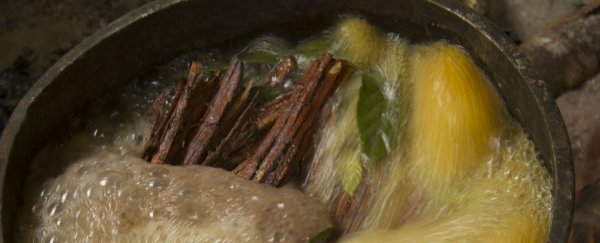Hallucinogenic tea brewed using plants from the Amazon Rainforest in South America could help treat depression, a new study suggests.
The natural ayahuasca tea, which has long been used by indigenous tribes for spiritual rituals and medicinal purposes, is well known for its hallucinatory effects, which certain celebrities, such as Sting and Lindsay Lohan, have vouched for.
It's made from the stalks of a jungle vine known as Banisteriopsis caapi and the leaves of the Psychotria viridis plant, which contain the pyschedelic compound dimethyltryptamine.
As Alexandra Ossola points out at Popular Science, "consuming the brew is notoriously hard on the system, resulting in excessive vomiting, disorientation, and occasionally death, but that doesn't stop thousands of 'ayahuasca tourists' from seeking it out every year."
Researchers at the University of São Paulo in Brazil think these tourists might be onto something, and are interested in the therapeutic potential of ayahuasca tea (AYA) as a faster-acting substitute for commercially available anti-depressant medications.
While there isn't a tonne of scientific data available about the long-term effects of ayahuasca, or its impact on the brain, the researchers suspect that some of the compounds in the brew could elevate levels of mood-altering serotonin in the brain.
In this preliminary study, the researchers gave ayahuasca tea to six participants between the ages of 35 and 60. These were people suffering from depressive episodes, and for whom conventional medication hasn't worked.
The objective "was to evaluate the acute effects of a single dose of AYA in patients diagnosed with depression and to test whether AYA administration could produce an acute antidepressant effect," the researchers wrote.
The participants were given between 120 and 200 ml of the tea, and were seated alone inside a quiet, dimly lit room, in a comfortable recliner for about four hours - more or less the duration of their high. During this time, the researchers asked them questions from clinical questionnaires to track their symptoms and depressive feelings.
As Ossola explains, "they found that the symptoms of depression decreased three hours after taking the ayahusaca… and they felt the positive effects for up to three weeks."
The results of the present investigation demonstrate that AYA has significant and quite impressive acute anti-depressive effects," the team notes.
And despite three participants vomiting, the team said there were no other major side-effects preventing the safe administration of the tea.
"The average time necessary for the onset of therapeutic action of commercially available anti-depressants is two weeks. Considering currently available medications, the fast anti-depressant action of AYA is promising, as it may provide faster reductions in depressive symptoms."
The team has reported their findings in the journal Brazilian Review of Psychiatry.
While it's an interesting study, there are several important limitations, including the very small sample size, and the lack of placebo and control groups. There is still a lot more work needed to measure both the positive and adverse effects of the drug.
The team, however, says it's already on the case. It has additional studies planned that will have larger sample sizes and use neuroimaging techniques to monitor brain activity.
Importantly, it should be noted that ayahuasca can have serious and possibly fatal side effects if it is taken in conjunction with anti-depressant medication, and a range of other pharmaceuticals and illicit drugs.
Source: Popular Science
